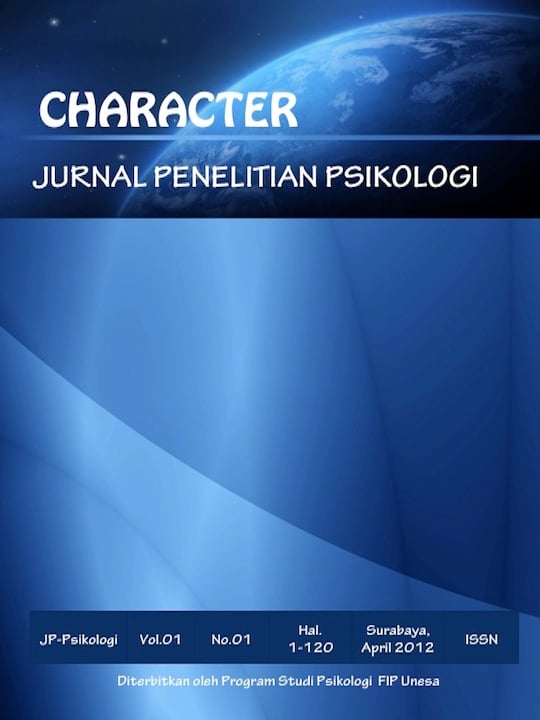POLA ASUH ORANGTUA SISWA BERPRESTASI NON-AKADEMIK
DOI:
https://doi.org/10.26740/cjpp.v9i6.47433Abstract
Abstrak
Siswa ialah individu yang terdaftar dalam lembaga pendidikan yang ingin mengembangkan suatu potensi akademik dan non akademik. Prestasi non akademik yang dilakukan oleh siswa adalah untuk melengkapi kebutuhan siswa dalam mengembangkan hobi, bakat, dan minat siswa. Orang tua berperan sebagai pendidik pertama bagi seorang anak. Pola asuh yang diberikan oleh orang tua kepada anak akan memberikan suatu proses dalam segala kegiatan anak termasuk prestasi anak. Penelitian ini dilakukan dengan tujuan untuk mengetahui pola asuh seperti apa yang diberikan kepada anak yang memiliki prestasi di bidang non akademik. Metode pengumpulan data ada penelitian ini ialah metode kualitatif fenomenologi melalui wawancara semi struktur. Menggunakan metode fenomenologi, sehingga analisisnya berupa Interpretative Phenomenological Analysis (IPA). Penelitian ini dapat diuji dengan keabsahan kredibilitas dengan menggunakan teknik member check. Subyek pada penelitian ini berjumlah 3 orang partisipan dengan masing-masing partisipan memiliki prestasi non akademik dibilang olahraga. Dalam penelitian ini menemukan tiga tema induk yakni penerapan pola asuh, bentuk dukungan orang tua, dan perilaku dan sikap anak terhadap pola asuh yang diterapkan. Dari ciri-ciri keempat pola asuh yang ada, orang tua ketiga subjek siswa berprestasi non akademik menerapkan pola asuh demokratis. Orang tua yang menerapkan pola asuh demokratis membuat anak yang memiliki segudang prestasi non-akademik dapat mengendalikan diri dan stress dengan baik selama latihan dan selama pertandingan, serta ceria dan memiliki hubungan erat dengan orang tua.
Kata Kunci : Siswa, prestasi non-akademik, pola asuh orangtua
Abstract
Children who wants to develop an academic and non-academic potential by registering in educational institutions are also known as students. The non-academic achievements is used for complementing students' needs in order to develop hobbies, talents, and interest. Parents have the biggest role to be the main and first educators for a child. Parenting style will provide a process in children's activities including children's achievement. This research aimed to get a better understanding about parenting style which given to the children who have achivements in non-academic fields. The data collecting method that used in this research is qualitative with phenomenological approach through semi-structured interviews. Using the phenomenological method, with the result that formed interpretative Phenomenological Analysis (IPA). This research used member check as validity of credibility technique. This research contains of 3 participants with different non academic. From the characteristics of the four existing parenting styles, the parents of the three subjects of non-academic achievement students applied democratic parenting. Parents who apply democratic parenting make children who have a myriad of non-academic achievements able to control themselves and stress well during practice and during matches, as well as cheerful and have a close relationship with their parents.
Keyword : Students, non-academic achievement, parenting style
Downloads
Downloads
Published
How to Cite
Issue
Section
License
Authors who publish in this journal agree to the following terms:
Copyright in any article is held by the author.
The author grants the journal, publication rights with the work simultaneously licensed under a Creative Commons Attribution License that allows others to share the work with an acknowledgment of the work's authorship and initial publication in this journal.
Authors may enter into separate, additional contractual arrangements for the non-exclusive distribution of the journal's published version of the work (e.g., posting it to an institutional repository or publishing it in a book), with an acknowledgment of its initial publication in this journal.
Authors are permitted and encouraged to post their work online (e.g., in an institutional repository or on their website) prior to and during the submission process, as this can lead to productive exchanges, as well as earlier and greater citation of published work.
 Abstract views: 627
,
Abstract views: 627
, PDF Downloads: 1075
PDF Downloads: 1075





